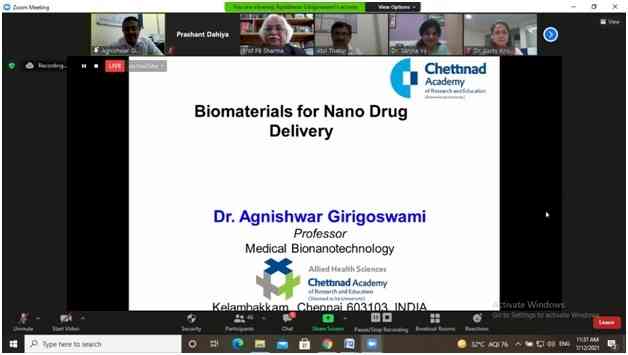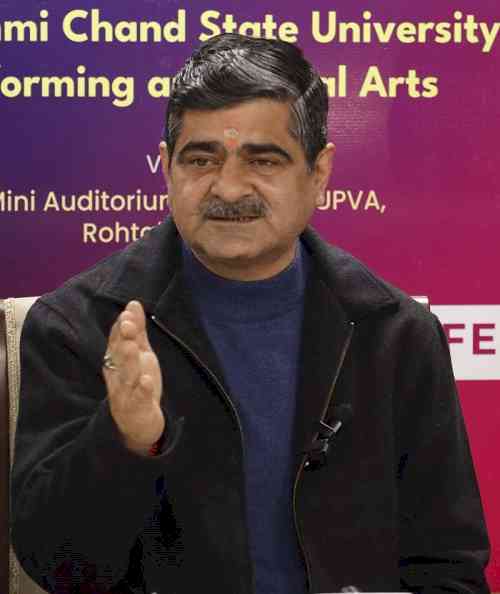`Recent Advances, Trends and Challenges in the field of Nanotechnology’
Faculty Development Program organized by Amity University Haryana

Gurugram: The main aim of this faculty development program is to understand the recent advances, trends and challenges in the field of Nanotechnology. Nanotechnology is the fastest growing field in all areas of science. Nanotechnology has proved to be a promising tool for the treatment of malignant growth as it offers newer and better treatment modalities by using nanomaterial. The FDP will have experts from various fields of nanotechnology such as batteries, agriculture, chemistry, biology, biotechnology. Keeping this in mind, the Amity Academics Staff College in association with Amity Centre of Nanotechnology, Amity University Haryana at Amity University Haryana organized a Five Day Online Faculty Development Program on ‘Recent Advances, Trends and Challenges in the field of Nanotechnology’ from 12th July to 16th July 2021. The program was inaugurated today by Prof P B Sharma, Vice Chancellor, Amity University Haryana in the august presence of Vice Chancellors of Amity Universities in India, Deans, Heads of Institutions, large number of faculty members, research scholars and 87 registered participants from various universities and institutions from across the country.
The University faculty need to continuously update their knowledge in their chosen field of expertise as well as keep themselves updated with the 21st-century skills and technologies to deliver not only up to date knowledge but also to participate in the creation of new knowledge through engagement in Research and Development and cause innovations and new product development.
Addressing the gathering Prof P B Sharma, Vice-Chancellor, Amity University Haryana explained about the role of Nanotechnology in different fields like Agriculture, Diagnostics, Environmental Science etc. There are eminent scientists working on different aspects of Nanotechnology viz. radar absorbing materials, antenna miniaturization, high density memory storage, diagnostics and diamonds etc.
“The ever expanding frontiers of Nano Science and Nano Technology are opening new horizons for scientific advancements and applications covering a vast canvas that cover almost all human and industrial activity, starting from new and smart Nano materials, Nano electronics and Nano Robots, Nanomedicines, Nano-diagnostics, Nanostructured composites, Nanosurface coatings, Nanoenergy generators, Nanoparticles for waste water treatment, Nanomachines and Nanomechanical devices all creating ever rising interest in Nano Science and Technology,Education and Research,” added Prof Sharma
Prof Agnishwar Girigoswami, CARE, Chennai, India while delivering his lecture on “Biomaterials for Nano Drug Delivery emphasized on the use of different biomaterials for nano drug delivery. The basic information about normal/targeted drug delivery, its delivery route, transdermal drug delivery systems and concept of sustained release and controlled release drug delivery patterns. He also explained about different biomaterials like polymers, magnetic nanomaterials and other liposomes for efficient drug delivery vehicles in a detailed manner.
“We need to focus on the role of the pH and temperature in the efficacy of drug delivery system and role of theranostics in health care and diagnostics. It describes the combination of using one radioactive drug to identify (diagnose) and a second radioactive drug to deliver therapy to treat the main tumor and any metastatic tumors,” says Prof Girigoswami.
In the second plenary session Dr. Sunil K Kushvaha, Principal Scientist, NPL, in his lecture ‘Scanning Probe Microscopy : Seeing at the Nanoscale’ explained about the research in the area of Scanning Probe Microscopy (SPM), its applications and the basics of nanoparticle synthesis, their characterization using different microscopic techniques. We need to understand about top down, bottom-up approach of nanoparticles synthesis and their limitations, 2D and 3 D particle formations with the physics behind it and also about thermoelectric power of new materials.
Dr Atul Thakur, Director, Amity Institute of Nanotechnology, AUH while delivering his opening remarks explained that, “Nanotechnology is an exciting field that has the potential to transform and is helping to considerably improve, even revolutionize, many technology and industry sectors such as information technology, security, medicine, energy, food safety, and environmental science, among many others. A deep understanding of materials at the nanoscale, i.e. at the scale of single atoms/molecules, is crucial in order to develop new nanotechnology applications.
Coordinating the event Dr Sanjna Vij, Program Director, Academic Staff College, AUH said, “High-quality professional enrichment programs for faculty members have become vital to higher education institutions to be able to compete in this fast changing world and Faculty Enrichment programs (FEPs) have proven to be fruitful for enhancing the knowledge and improving teaching skills among faculty members. Faculty Enrichment Programs play a key role in helping faculty members to cultivate their roles and having a positive impact on student learning, satisfaction, motivation and make them ready for the 21st century skills.”
Dr Lucky Krishnia while delivering the vote of thanks said, “The role of education and how development is required at each step and how the spark to learn new things should always be on which would help to develop the faculties and that is how nation will be developed.”
Rear Admiral K K Pandey (Retd), HR Director, Dr Ankur Kaushal, Dr Preeti Thakur, Dr Manoj Kashyap, Dr Amrish Panwar, Dr Parveen Kumar along with faculty and students attended the webinar.



 cityairnews
cityairnews 










